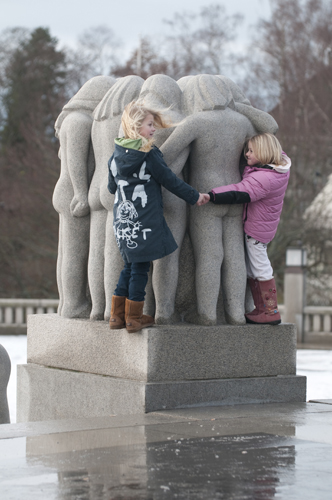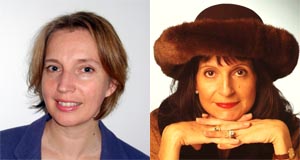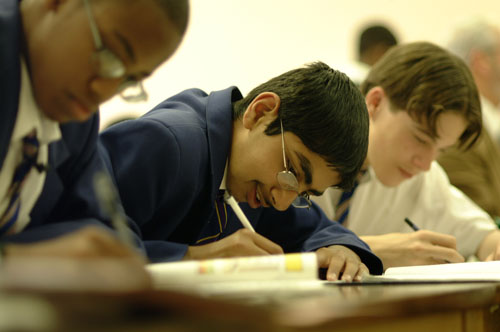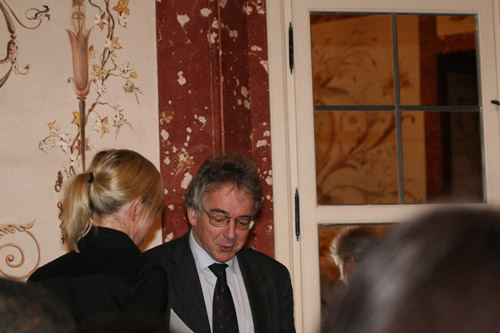
Why have I never been to Norway, Kíváncsi vagyok, amikor a csodálatos ország lélegzetelállító képeit nézem a Google keresőben. E-mailt küldök a közeli barátomnak, Norvég szakértő és tehetséges építész, Maddy Vigeland, és megkérjük, hogy ossza meg velem a norvég nézet az új oktatási poszt.
“Néhány dolog jutott eszembe,,” Maddy e-mailek vissza. “A síelés mellett, A fjordok — mérföld és mérföld a drámai táj, lazac / lox, úgynevezett lutefisk. Then, népdalok, A bátorság Leif Ericson, kalandjait Thor Heyerdahl és a Kon-Tiki, a szomorúságot Edvard Munch festmények, A merész és brutális szobrok Gustav Vigeland, the outrageous integration of landscape with culture in Oslo’s new ballet and opera house by Snohetta architects. Is, Liv Ullman, Sonje Henie, and perhaps the most distinguishing characteristic of all — the general agreement by all Norwegians on the way to live — focused on the quality of life.”
Thank you Maddy Vigeland. I’m hooked, but before I will commit to admitting I’m booked, allow me to share an educational view of Norway from my newer Norwegian friend, DR. Kirsten Magával ragadó Are, distinguished professor in the University of Oslo Faculty of Education.
Milyen típusú oktatási rendszer lehetővé teszi egy ország, hogy az emberek készségek szükségesek a globális versenyre?
The latest findings from large scale assessment and knowledge reviews support conclusions that comprehensive education is most successful. In comprehensive education, students acquire knowledge and experience within demographically diverse learning milieus and face a multitude of expectations that are both cultivating and qualifying. Schools where students are grouped according to their abilities and aptitudes, are not as effective.
Mi a véleménye az egységes tesztelési?
Standardized testing informs policy makers and practitioners about some of the outcomes of education. Azonban, these tests are limited in scope in measuring the quality of teaching and learning in schools. Some assessment systems, like PISA, measure competencies of large populations, között 4,500 és 10,000 15-16 year old students in each country. These tests might stimulate debates on what is the intellectual capability of students around the globe, but are not so good at measuring the content and methods of teaching.
Ha általánosítás lehetséges, what elements are missing from the current systems, such as critical thinking or other dimensions of human interest and intelligence?
The OECD studies concentrate on the human competencies that are needed in a learning society. This might lead to an orientation to productive learning and performance. Azonban, individual capacity as well as communication is also dependent on receptive skills, which develop through understanding, interpretation and reflection. Ezek a képességek nem könnyen mérhető, de még mindig elengedhetetlen, hogy legyen egy művelt polgár.

Mit lehet tenni, hogy jobban kezeljék a lelki egészség és a szellemi potenciál az egyes, amely úgy tűnik, hogy szenved a jelenlegi rendszerben?
A díjnak az iskolavezetők, hogy elősegítse az oktatási rendszerek, amelyek alapján az alapvető értékek, mint az emberi méltóság és tisztelet. Ez azt jelenti, hogy hangsúlyozzák felelősséget nem pedig az elszámoltathatóság és a forma értékelési rendszerek szerint általános céljait iskoláztatás. Fontos, hogy a rendszer áll iskola “két lábon”: on a well designed curriculum and assessment for learning. For the moment, policy makers have been most concerned about one leg, to create expectations about performance through assessment and accountability systems. They forget that a well-working system depends on good structures, framed by systemic reform and the curriculum.
In Norway, there is a tradition to formulate national curriculum guidelines which are broad based, yet provide a framework for what schooling is about. The guidelines are focused on central aims and subject matter which presuppose thoughtful teaching to be accomplished well. This approach is deliberative in character and guarantees that teaching manuals and prescriptions, whether they be scientific or political, are adjusted to deliberative practices in schools. Emphasis on deliberation will address both emotional well-being and the intellectual potential of the individual.
Egy nagyobb szempontból, az Ön országa definíciójának oktatási kiválóság figyelembe veszik az életminőséget az egyének és a társadalom, beleértve a művészi és kulturális eredményeit?
The most prominent example of this approach is the Finish educational system. Finnországban, a new national curriculum will be implemented in a few years, giving priority to aesthetic subjects. The curriculum is comprehensive, yet students in Finland perform very well in large scale assessment, such as PISA, so a comprehensive curriculum might stimulate good results/outcomes. The General Curriculum in Norway describes a comprehensive curriculum as well and the integrated human being as one that is both cultivated and qualified. Here the tradition is to guarantee not only good results on national tests, hanem egy iskolai rendszerben, ahol a diákok jól érezzék magukat, és tapasztalni a jó tanulási környezet. Azt hiszem, az öröm és a kemény munka kell járnia.
Világ Bölcsesség Norvégia
Standardizált tesztek nem mérik az oktatás minőségének, illetve a tanulás minőségét az iskolákban. Túl sok a hangsúlyt az oktatási rendszerben értékelésével és az elszámoltathatóság helyett tanterv és felelősség. Hogy a tanárok nagyobb mozgásteret alkalmazkodni irányelveket tanulók igényeit. A meghatározás oktatási kiválóság Norvégiában: átfogó tanterv, ugyanúgy, mint Finnországban, ahol a tanuló válik mind a termesztett és képzett. Öröm és kemény munka kell járnia.

Photos courtesy of Norwegian Embassy.
In A Global Search for Education, csatlakozzon C. M. Rubin és világhírű szellemi vezetők köztük Sir Michael Barber (UK), DR. Leon Botstein (US), DR. Linda Darling-Hammond (US), DR. Madhav Chavan (India), Professzor Michael Fullan (Kanada), Professzor Howard Gardner (US), Professzor Yvonne Hellman (Hollandiában), Professzor Kristin Helstad (Norvégia), Professzor Rose Hipkins (Új-Zéland), Professzor Cornelia Hoogland (Kanada), Mrs. Chantal Kaufmann (Belgium), Professzor Dominique Lafontaine (Belgium), Professor Hugh Lauder (UK), Professor Ben Levin (Kanada), Professzor Barry McGaw (Ausztrália), Professzor R. Natarajan (India), Sridhar Rajagopalan (India), Sir Ken Robinson (UK), Professzor Pasi Sahlberg (Finnország), Andreas Schleicher (PISA, OECD), DR. David Shaffer (US), DR. Kirsten Magával ragadó Are (Norvégia), Chancellor Stephen Spahn (US), Yves Theze (Lycee Francais US), Professor Charles Ungerleider (Kanada), Professzor Tony Wagner (US), Professzor Dylan Wiliam (UK), Professzor Theo Wubbels (Hollandiában), Professzor Michael Young (UK), és professzor Minxuan Zhang (Kína) mivel azok feltárása a nagy kép oktatási kérdés, hogy minden nemzet ma szembesül. A Global Search Oktatási közösségi oldal
C. M. Rubin a szerző két legolvasottabb internetes sorozat, amely megkapta a 2011 Upton Sinclair díjat, “A Global Search for Education” és “Hogyan fogjuk olvasása?” Ő a szerzője a három bestseller könyv, Beleértve The Real Alice Csodaországban.
Kövesse C. M. Rubin on Twitter: www.twitter.com/@cmrubinworld






Legutóbbi hozzászólások